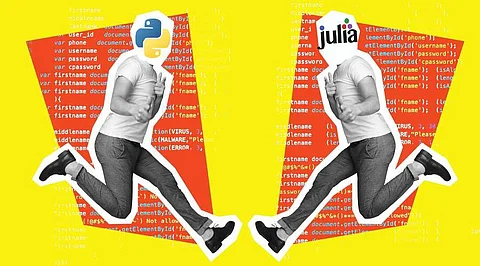

Python has gotten a lot of attention since last year when it was named the programming language of the year by the Tiobe Index. It is very popular among data scientists and machine learning specialists, and it is widely utilized in Artificial Intelligence.
Python programming is an open-source programming language that is widely used due to its simplicity and low learning curve. Python's popularity has skyrocketed in recent years, but Julia, a comparably younger language, has recently received a lot of attention and searches.
It has been said that Julia, as a programming language, can compete with and dethrone Python. Python has been around for far longer than Julia, and it quickly became the favored option for developers and programmers. In fact, according to a new poll, Python has been named the top language that developers would choose if Julia wasn't available.
Julia has emerged as a viable Python competitor with strong features, and Python is not far behind.
Here is the ultimate comparison between Python vs Julia
Julia is as quick as C as a programming language. The creators wanted something 'quick,' therefore it was conceived and developed for speed. Julia is not interpreted; hence it is a fast-programming language; it is also compiled at run time using the LLVM framework. Julia provides high speed without any optimization or bespoke profiling procedures and is thus the solution to all of your performance issues.
Julia and Python, both programming languages, may perform tasks in parallel. Python's techniques, on the other hand, need data serialization and deserialization to parallelize between threads, whereas Julia's parallelization is far more precise.
Julia also has less top-heavy parallelization syntax than Python, which lowers the barrier to its utilization.
Every programming language must have a large and active community behind it. The programming language should have a strong following in the community. Julia has a vibrant and energetic community, however, because it is a new language, the size of the community is limited.
Python, on the other hand, has been around for a long time and hence has a large community support that works in its favor. Julia's programmer community is still in its infancy. The big Python community is a major benefit for developers since it provides many resources to handle difficulties and uncertainties.
One of Julia's significant limitations is that packages aren't well maintained. It takes too long to plot data at first, however, Julia can directly communicate with C libraries. Julia will require established libraries to thrive on their own because it is new to the software culture.
Python, on the other hand, offers a plethora of libraries, making it simple to do any extra tasks. Julia lacks the number of libraries that Python has, thus it is easier to use because of its comprehensive selection of libraries. The majority of third-party libraries also support Python. A wide number of third-party packages that it can support is critical for any developer or programmer.
Julia and Python are both dynamically typed programming languages, which means that developers do not need to declare variables. However, Julia allows you to blend and profit from both static and dynamic types.
Julia has a really good relationship with Shell. For example, shell commands to inspect the file's content. Julia variables are exported to the shell as environment variables. Once opened, users can modify the file.
Working with Shell commands is much easier in Julia than in Python. In this aspect, Julia is well ahead of Python.
Join our WhatsApp Channel to get the latest news, exclusives and videos on WhatsApp
_____________
Disclaimer: Analytics Insight does not provide financial advice or guidance. Also note that the cryptocurrencies mentioned/listed on the website could potentially be scams, i.e. designed to induce you to invest financial resources that may be lost forever and not be recoverable once investments are made. You are responsible for conducting your own research (DYOR) before making any investments. Read more here.
